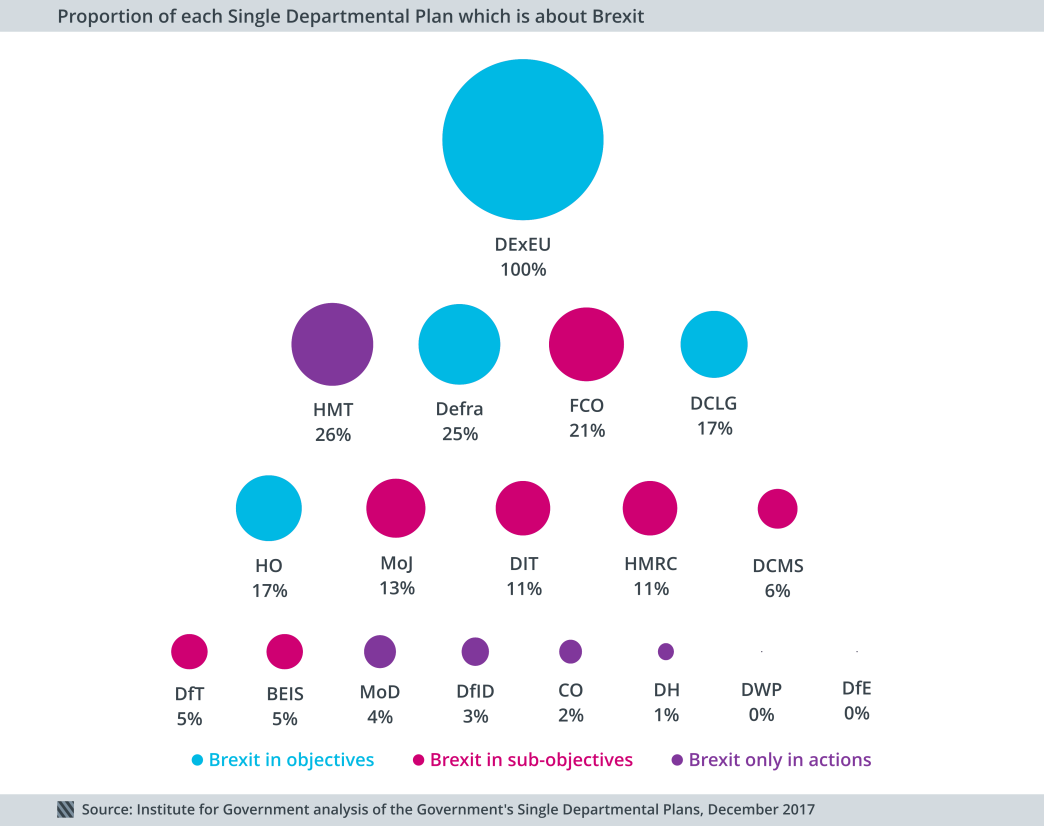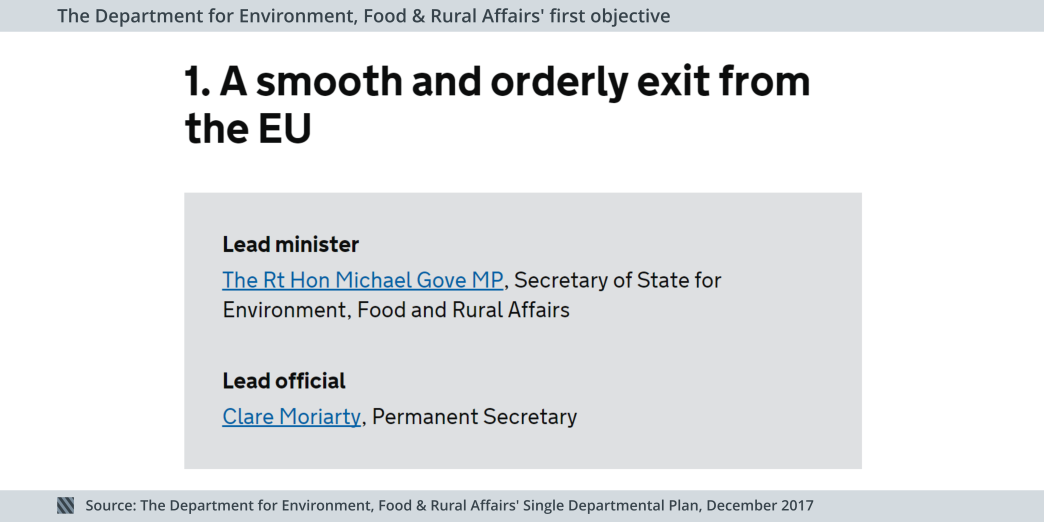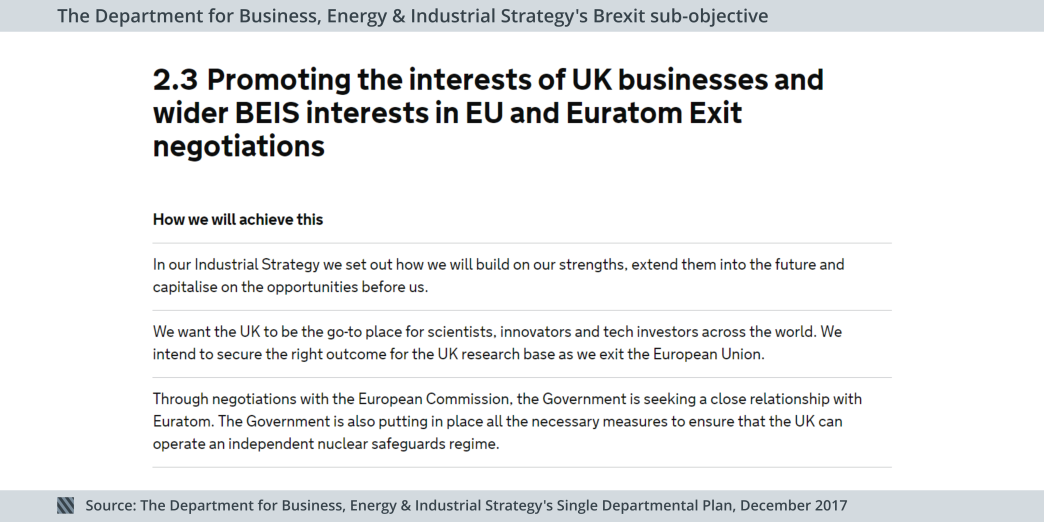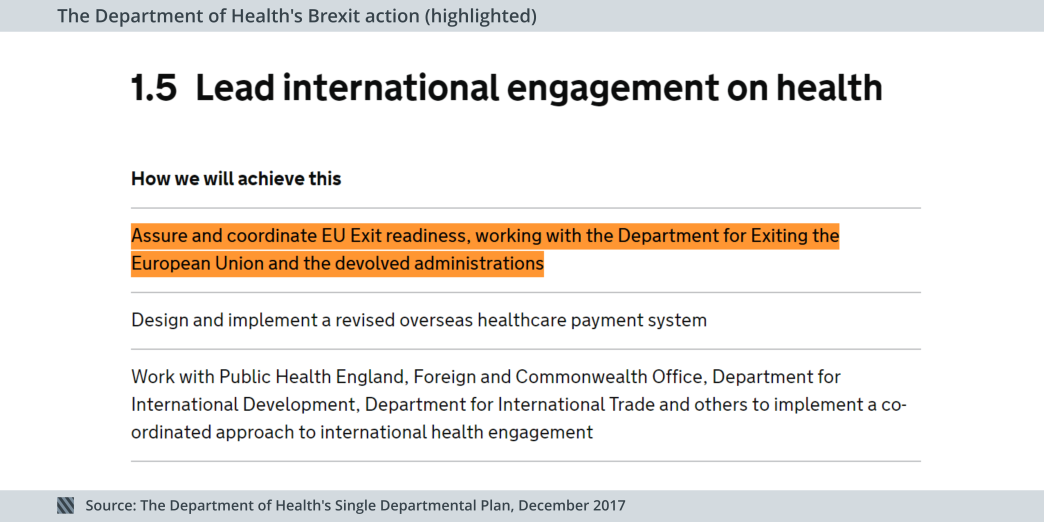Burying Brexit in the Government’s plans
Negotiating and implementing the UK’s withdrawal from the EU is the Government’s most important job over the coming years.
Negotiating and implementing the UK’s withdrawal from the EU is the Government’s most important job over the coming years. But Brexit rarely features in its Single Departmental Plans, says Lewis Lloyd.
The Single Departmental Plans outline the Government’s departmental objectives for the coming year. They were published last week for the second time, having been introduced in February 2016.
Strangely, the new plans skate over what Sir Jeremy Heywood believes is “the biggest and most complex challenge the Civil Service has faced in our peacetime history” – Brexit.
Each Single Departmental Plan (SDP) sets out between three and seven key objectives. These are broken down into sub-objectives to be achieved through a specific set of actions.

”Get[ting] the best Brexit deal for Britain” is listed as the primary objective for the Government as whole.
Despite this, only four departments explicitly refer to Brexit in their own objectives.
Take out the Department for Exiting the European Union – whose only purpose is to manage Brexit – and you’re down to three: the Department for Environment, Food and Rural Affairs (Defra), the Home Office (HO) and the Department for Communities and Local Government (DCLG).
Defra comes closest to admitting the full impact of Brexit
Defra is the most up front about the impact that Brexit will have on its work. “A smooth and orderly exit from the EU” is the first of its five objectives, and the only one owned by the Permanent Secretary and the Secretary of State. The negotiation and implementation of Brexit also crop up elsewhere in its plan, especially in relation to fisheries and food standards.

But even here, Defra’s plan underplays the work involved. Close to 80% of Defra’s activities are framed by EU legislation, making the department particularly exposed as the UK’s relationship with Europe takes a new form.
Based on our analysis, though, only around a quarter of Defra’s plan is directly related to Brexit.
Other heavily affected departments avoid using the B word
Other departments that will see vast swathes of their work shaped by Brexit in the coming years are even more reticent. The Home Office, which will have to handle changes in immigration, customs, and cross-border law and security collaboration, wraps these challenges up in one ‘Leaving the European Union’ objective buried at the bottom of the page.
The Treasury (HMT) doesn’t acknowledge Brexit at all in its objectives – although anticipated actions relating to Brexit are dotted throughout its plan.
The Department for Business, Energy & Industrial Strategy (BEIS) will be one of the most affected departments by Brexit, but goes to even greater lengths to avoid the subject. The National Audit Office (NAO) says BEIS has the largest number of Brexit-related work streams of any department: 69 of the 313 across government.
John Manzoni has flagged BEIS as one of the main departments that will need to reprioritise in the wake of Brexit. Yet in the BEIS plan, Brexit merits only one sub-objective.

HMRC and the Department for Transport (DfT) were also picked out by Manzoni as key departments to focus on, but they give Brexit equally cursory treatment. Along with the Foreign Office (FCO) and the Ministry of Justice (MoJ), they outline a range of activities that will inevitably be affected by Brexit – but limit any explicit discussion to one sub-objective apiece.
The Department of Health’s (DH) handling of Brexit is stranger still. Despite having the third highest number of Brexit work streams of any department, only one action in the department’s plan explicitly refers to Brexit.

Leaving the EU will have an impact on staffing and research in the health sector. But dealing with this does not merit even a mention in the Department of Health’s plan.
The Cabinet Office and Ministry of Defence mention Brexit only in passing. The Department for Education – despite the impact Brexit will have on universities – and the Department for Work and Pensions don’t refer to Brexit in their plans at all.
Departmental work and government priorities seem misaligned
It may be that the Government has “more detailed” unpublished plans that much more explicitly acknowledge the impact that Brexit will have. On this basis, the Single Departmental Plans appear to be designed to reassure us that the process of leaving the EU has not become all-consuming for government – as the Prime Minister was keen to emphasise in her evidence to the Liaison Committee.
Alternatively, it may be that departments see Brexit as so obviously underpinning their work that it isn’t worth mentioning. But that fails to convey the urgency of the many tasks that need to be carried out in preparation for Brexit.
It would be more reassuring if departments were frank about the impact of Brexit. Otherwise, we can’t rule out the possibility that these plans really do reflect their priorities. Which would mean the Government needs an urgent reality check, and that we should be seriously concerned.
If the Government wants to gain public trust as it tries to manage the most significant political change for a generation, departments should be honest about the challenges they face.
Abbreviations of government departments.
- Topic
- Brexit Civil service
- Keywords
- Withdrawal Agreement Trade Foreign affairs
- Administration
- May government
- Department
- Department for Exiting the European Union
- Publisher
- Institute for Government